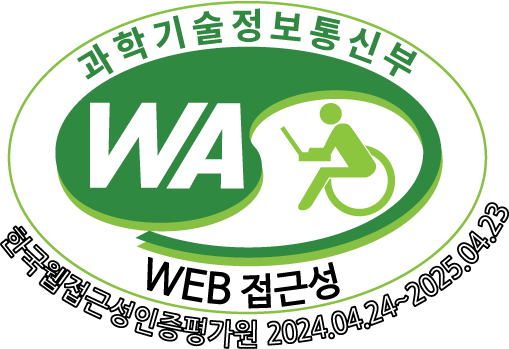Country Assistance
While overseas aids normally carries a wide array of programs and projects spanning various sectors and many theme around, it incorporates disability into neither a component nor target of programs to achieve. Guidelines and policy consultation for disability-inclusive development program are still much to be evolved, and even existing programs are in the beginning stage of their development. The secretariat implements programs benefiting persons with disability in cooperation with our partners in the Asian Pacific region. The secretariat's work is based on its years of experiences and expertness on policy R&D, employment, and accessibility regarding to disability in South Korea. At national level, programs are categorized by the duration of each project as mid and long-term or short-term.
Eligibility of recipient country on Make the Right Real Fund is determined by the following conditions; the alignment of a country's policy direction with Incheon Strategy, the legitimacy of national policy on persons with disabilities, the competence of implementing agencies and a country's economic conditions. After the selection of each recipient country, project is proceeded as presented as below; analysing the Country partnership strategy of South Korean government and the national development plan of recipient country; conducting a feasibility study; consulting the recipient country on their proposals; endorsing the adoption of MOU between recipient and donor government; implementing the project in cooperations with experts from South Korea and the recipient country; following up with the project such as visiting and monitoring the recipient country; and managing and evaluating the project, using key indicators of the Incheon Strategy.
Development Project for Persons with Disabilities in Mongolia
Background
The project for the first recipient country, Mongolia, spans three years from May 2015 to June 2018. The project, titled as "Early Detection and Intervention for Children with Disabilities", aims at building medical services delivery system that is geared to diagnose with the various symptoms of disability. It is the Ministry of Population Development and Social Protection and the National Rehabilitation Development Centre of Mongolia* that participate in as executing agencies with the secretariat. In 2014, the secretariat conducted a feasibility study and visited stakeholders while inviting the relevant officials to Korea for a capacity building program. Finally, MOU between Korea and Mongolia was accomplished in April 2, 2015.
*The Ministry of Population Development and Social Protection changed its naming to Ministry of Labor and Social Protection and the National Rehabilitation Development Centre of Mongolia changed to Vocational Rehabilitation Training Centre
Activities
The project covers the capital city, Ulaanbaatar and 21 Aimag; administrative districts of the country. Korean disability experts introduced early detection tools and how to use them. The first year was to develop early detection tools and guidelines. In the second and third year, capacity building program and training were implemented for various stakeholder including medical staff and family members of persons with disabilities followed by monitoring and evaluation of the project. More than 3,000 people with/without disabilities have participated in the training for the past three years.
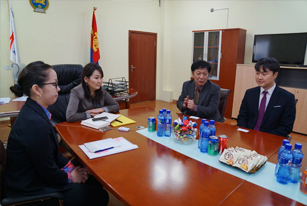
[Meeting with officials of Vocational Rehabilitation center (2016)]
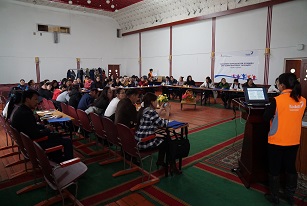
[Introducing how to use the tools for early detection & intervention (2017)]
Development Project for Persons with Disabilities in Lao PDR
Background
The project for persons with disabilities in Lao PDR is called "Poverty Reduction by Enhancing Work and Employment through Vocational Training for Disabled People". This project initiated from October 2015 and finished on December 2018, as three-year project.
The secretariat's visit to Vientiane of Lao PDR took a place for feasibility study in August 2014 and invited relevant officials for an invitational workshop in Korea. On October 14, 2014, the secretariat with the Ministry of Health and Welfare of Republic of Korea, endorsed the adoption of MOU with the National Committee for the Disabled People and the Elderly (Hereafter referred as to NCDE) of Lao PDR and the Lao Disabled People's Association (Hereafter referred to as LDPA) to partner the secretariat at national level.
Activities
After the feasibility study, five representatives from Lao including Director-General of NCDE, Bounpone Sayasenh visited Korea for an expert meeting from September 29 to October 2, 2014. During the meeting, one of the delegations presented a proposal for the project "Poverty Reduction by Enhancing Work and Employment through Vocational Training for Disabled People".
The Kaenkabao Vocational Training Centre was selected as a target institution of the proposal and from October 2015 to September 2016. Four subjects were provided to total 110 trainees from 7 provinces of Southern Laos including the Savannakhet province. After the evaluation of the first year of the project, the secretariat and LDPA signed the agreement on project extension for the second year, on December 14, 2016.
For the second year of the project, from December 2016 to October 2017, the project provided vocational rehabilitation training (financial management training & livestock raising training) and supplies for start-up business (livestock such as goats and catfish) to 62 persons with disabilities (initial goal was 53 persons) in Vientiane. It also provided training for raising awareness on disability for 52 persons, including government officers and families of persons with disabilities. The third year of the project was implemented from February to December 2018 on the similar way of the second year. There were 53 persons with disabilities (initial goal was 52 persons) who were provided vocational rehabilitation training and supplies for start-up business. Also, there were 56 persons (initial goal was 52 persons) who are the local authorities’ officer and families of persons with disabilities participated in the raising awareness training.
![[Interview with participants of the third year (2018)]](/image/contents/busi_img51.jpg)
[Interview with participants of the third year (2018)]
![[The final celebration ceremony of Lao PDR project (2018)]](/image/contents/busi_img52.jpg)
[The final celebration ceremony of Lao PDR project (2018)]
Development Project for People with Disabilities in Indonesia
Background
The project’s title for the persons with disabilities in Indonesia is ‘The Independent Living Through Vocational Training for Persons with Disabilities’. The starting point of this project was the participation of Indonesian delegation to the secretariat’s capacity building program for partners from the Asian Pacific nations. Based on the project concept note the Indonesian delegation submitted, a feasibility study visit was conducted twice at February and November 2016 and resulted as an MOU between the Korean Ministry of Health and Welfare, and the Indonesian Ministry of Social Affairs. After signing the MOU, the National Centre for Social Rehabilitation Persons with Physical Disability (Balai Besar Rehabilitasi Sosial Bina Daksa, BBRSBD) was selected as an agency to implement the project, and the first year of the project started from November, 2016.
Activities
After signing the MOU, the 3-year project to support the independence of persons with disabilities in Indonesia was conducted from November 2016 to December 2019 focusing on CBR (Community Based Rehabilitation). In the first year (Nov. 2016 ~ Oct. 2017), the training for Cadres and vocational rehabilitation service (culinary, batik, handicraft) for 50 persons with physical disabilities were conducted in Bantul, Yogyakarta. In the second year (Dec. 2017 ~ Dec. 2018), the training for Cadres and vocational rehabilitation service (culinary, handicraft, fishery & animal husbandry) for 64 persons (32 persons with disabilities & 32 family members) were provided in Bantul, Yogyakarta. In the third year (Dec. 2019 ~ Dec. 2020), the training for Cadres and vocational rehabilitation service (culinary, barber, sewing) for 50 persons (25 persons with disabilities & 25 family members) were provided in Tabanan, Bali.
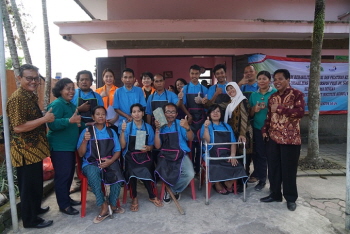
[Trainees of Culinary Class (2019)]
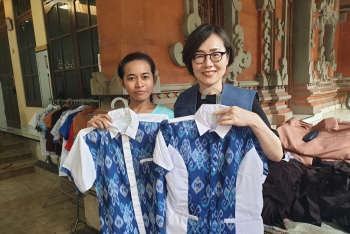
[Hand-made Shirts by a Trainee of Sewing Class (2019)]
Development Project for People with Disabilities in Myanmar
Background
The title of the project for the persons with disabilities in Myanmar is 'Promoting Employment Opportunities of Persons with Disabilities in Coffee and Bakery Industry.’ The starting point of this project was the participation of Myanmar delegation to the secretariat’s capacity building program for partners from the Asian Pacific nations in 2016. Based on the project concept note the Myanmar delegation submitted, a feasibility study visit was conducted twice in 2016 and 2018. In 2019, KODDI and Shwe Minn Tha Foundation (SMTF) has agreed on the contract for the 1st year project.
Activities
The 1st year project is to provide a baker and barista training for the persons with disabilities in Yangon from December 2018 to March 2020. A total of 52 trainees have completed the vocational training, 10 have completed internship and 6 have been able to get a job after the project. The training was divided into 6 batches, each had 1-month of training. The 6 local shops have cooperated for the internship for 3 months each. There seems to have more demand in baker jobs as 42 were in baker training whereas 10 were in barista training. The 2nd year project called “Promoting Employment Opportunities of Persons with Disabilities in Coffee and Bakery Industry” provided not only vocational training but also internship and job coach service for 96 trainees. The training was divided into 4 batches for 1-month each, and internship for 2-months with over 5 local shops. After the training, SMTF has provided the job coach service aiming for an actual employment. The project was implemented from April 2020 to July 2021 which supported one-stop provision from vocational training on bakery and internship to employment service to all trainees. After three batches of training (1st: 10 pax, 2nd: 10 pax, 3rd: 12 pax), it has targeted for sustainable employability improvement by providing 32 trainees an internship from October 2020 to July 2021 and job counseling.
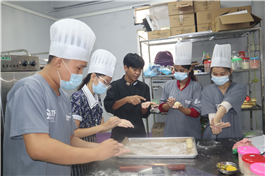
[Cafe(2021)]
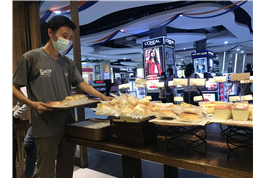
[Cafe Opening Ceremony(2021)]
Cafe Opening Project in Myanmar
Background
The name of the project is Opening the Cafe & Bakery Shop to Create Employment Opportunities of Persons with Disabilities Project. It is a follow-up project after the ‘Promoting Employment Opportunities of Persons with Disabilities in Coffee and Bakery Industry’ project, and is designed to provide an employment opportunity by open the cafe hiring employees with disabilities. The MOU ceremony was held on 8th December 2020 with KODDI and the implementing agency, Shwe Minn Tha Foundation.
Activities
After the MOU ceremony, KODDI has distributed the initial fund for opening the cafe, and it has been implemented from December 2020 to September 2021. As a result, one cafe hiring employees with disabilities has opened, and the name of the cafe is Golden Hope Cafeteria & Bakery House located in Hlaing Township, Yangon, Myanmar. Out of 75% of the total employees, which is 6 people out of 8, are employees with disabilities. Four of them are people with physical disabilities and two of them are people with hearing disabilities. And 66.6% of the employees with disabilities, which are 4 people out of 6, are trainees from the ‘Promoting Employment Opportunities of Persons with Disabilities in Coffee and Bakery Industry’ project. The project is successfully finished with the cafe opening ceremony held on 15th October 2021.
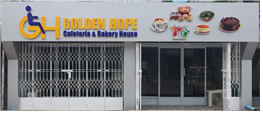
[Cafe(2021)]
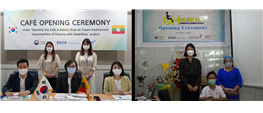
[Cafe Opening Ceremony(2021)]
Short term Development Project
Background
In Asia-Pacific, limited access to physical environments, transportation, information, knowledge, and communication compounds with the lack of social service and protection. Short-term development project intends to increase the mobility of persons with disabilities, and lower barriers posed to them. The secretariat examines needs of persons with disability in the region and determines the type and amount of assistive devices - such devices as wheelchairs accessible vehicle, commode - to be provided solely based on the needs of persons with disability. Ensuring the availability of assistive devices would help create more economic and social opportunities for persons with disability.
Activities
The secretariat has provided National Rehabilitation Development Centre of Mongolia (NRDC) with wheelchair accessible vehicles. Another partner state Nepal has geographical characters of the country which challenges the mobility of persons with disability. Through 'Make the Rights Real Fund', the ministry of Women, Children and Social Welfare of Nepal, Spinal Injury Rehabilitation Centre (SIRC) provided commodes to persons with disability at Spinal Injury Rehabilitation Centre, in consultation with the secretariat. Third country, Lao PDR eagerly involved in consultation with the secretariat. Following the request of the Lao Ministry of Labor and Social Welfare, the secretariat provided wheelchair accessible vehicles to Laos Disabled Women’s Development Centre (LDWDC). Based on the feasibility study conducted at November 2016, the secretariat delivered braille information instruments to Blind schools of Yangon. Futhermore, for the successful implementation of ‘The Independent Living Through Vocational Training in the field of bakery for Persons with Disabilities in Myanmar’ project, secretariat has provided Shwe Minn Tha Foundation (SMTF) with wheelchair accessible vehicles. In 2020, as per request of Persons With Disabilities Foundation (PWDF) Cambodia, KODDI has provided a wheelchair accessible vehicle, which will be utilized for mobilizing the persons with mobility disability to the access of social services.
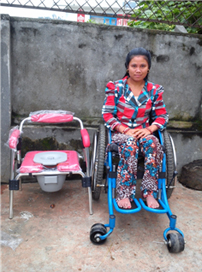
[Commodes, Nepal (2015)]
![[Wheelchair accessible vehicle, Cambodia (2020)]](/image/contents/busi_img242_1.jpg)
[Wheelchair accessible vehicle, Cambodia (2020)]
Others
Feasibility study in Cambodia
In March 2014, the secretariat visited Cambodia to conduct feasibility study in Phnom Penh and Battambang. During the visit, the needs assessment and consultation with officials of the Battambang Spinal Injury Rehabilitation Centre(SIRC) were completed. The feasibility study team visited the Cambodian Ministry of Society, Veteran and Youth Rehabilitation, Development Committee, World Health Organization Cambodia office and Korea Foundation for International Healthcare Battambang office to gain recent issues and knowledge around Cambodia's policy on and challenges for persons with disabilities. The need for cooperation with multilateral institutions and bilateral donors remains high for that the country is on the rapid transition with high economic growth and opens up toward outside world.
Feasibility study in Nepal
On deliberation of expanding the scope of development project, feasibility study took place in Nepal, looking at the viability of project on disability in Kathmandu and Sanga in July 2014. KODDI and Korea Spinal Cord Injury Association conducted a feasibility study with the general manager of Department of Convenience promotion assisted. Further more by visiting the Nepali Ministry of Welfare and Population, Nepal Spinal Cord Injury Rehabilitation Centre (SIRC), the study offered valuable insight to the general status of nepali persons with disability, and discussed cooperation modality of future plans.


